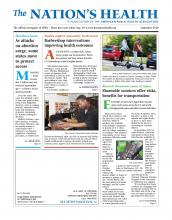The world can be scary, especially when you’re a kid. There are a lot of things that might frighten children — clowns, what’s under the bed, birds. You name it, there are children out there who are afraid of it.
And while a lot of these things become less scary when kids get older, there are many things in the world that pose real dangers.
Turn on the news and you’ll find endless reports on violence and disasters.
With the constant stream of information, sometimes it can be easy to forget that some of the terrible things in the world aren’t happening right outside, even if it’s a beautiful sunny day in your neck of the woods.
As an adult, it can be necessary to keep up with the news. But as a parent, guardian or caregiver, you need to limit your child’s exposure to the scary things that they see on the news.
It’s important to think about the amount of exposure kids have to the endless news cycle. You should monitor how much they’re taking in from the internet and turn it off when it’s too much, says David Hill, MD, FAAP, pediatrician and immediate past chair of the American Academy of Pediatrics Council on Communications and Media.

Photo by Asiseeit, courtesy iStockphoto
“They don’t need to see pictures and videos of what has been happening,” Hill says. “If they happen to see it, once is enough.”
While limiting exposure is good, you can’t outright prevent it. So when something terrible in the world happens and your child learns about it, what should you do?
“It’s important to start by asking questions,” Hill says. “You might think that you know what they’re thinking or feeling, but until you ask, you don’t know. And children surprise us. Frequently.”
Questions like “What do you think is going on?” or “What do you know about this?” are good places to start the conversation. It’s likely that kids have some misunderstandings about the situation.
Things like hurricanes and mass violence are not easy for young children to understand. They might think that they’re going to be hurt or that their loved ones are in danger, Hill says. But these beliefs can be corrected.
Once you have a handle on what they know about the situation, you can talk about what’s going on.
“Be truthful, be direct, but also be age appropriate,” Hill says.
Don’t overwhelm children with heavy ideas like politics or death. Use concepts that are right for your child’s level of understanding.
And sometimes, tragedies do hit close to home. People who live in areas heavily impacted by hurricanes or tornadoes know this all too well. And, terribly, sometimes mass violence can happen in your area.
If you and your child are affected by whatever is making news, it’s important to reaffirm that you both are going to be OK. A child’s biggest concern is often the well-being of their parent, whether they know how to voice it or not, Hill says.
If you have to evacuate to get away from dangerous weather, your child is going to have a lot of concerns. Young children may worry about their toys, or if they’ll get to go back to their home or school.
Be honest and be reassuring, Hill says, and make sure that they know what’s going on.
If you’re going to be living with relatives or at a hotel for a few weeks, tell your children that. If you’ve lost your home, make sure they know that they’ll have another one as soon as you can manage it. Stick with what can be done about the problem, and make sure they know that you are all safe.
Coping with school lockdowns
For both parents and kids, there are fewer things more frightening than the prospect of mass violence at school. In recent years, schools have worked to protect and prepare students with lockdown drills. These drills can cause anxiety in children of all ages, especially teens that are more able to comprehend violence.
“The way the lockdown drills are conducted, it might give a child the idea that this is an everyday occurrence that might happen in the next week or two and they need to be ready,” Hill says.
It’s important to talk with your children and put the danger in context. Remember that it’s extremely unlikely that your child will experience a school shooting, Hill says. Assure them that it’s not something that is likely to happen to them or at their school.
For more information on what to say to children, visit www.healthychildren.org.
- Copyright The Nation’s Health, American Public Health Association









